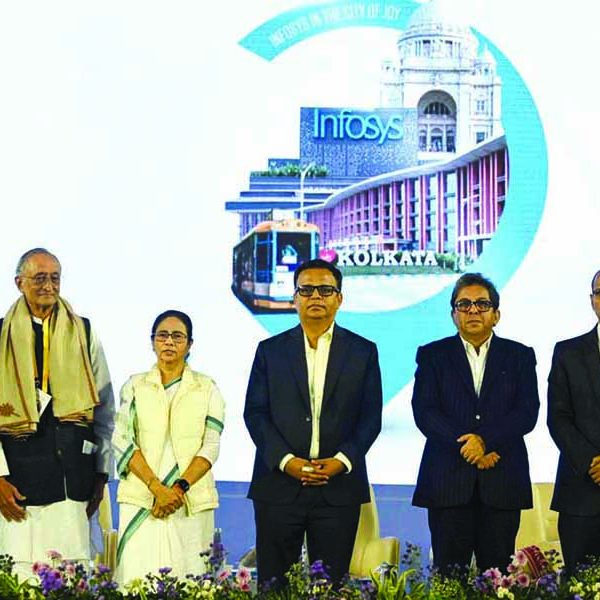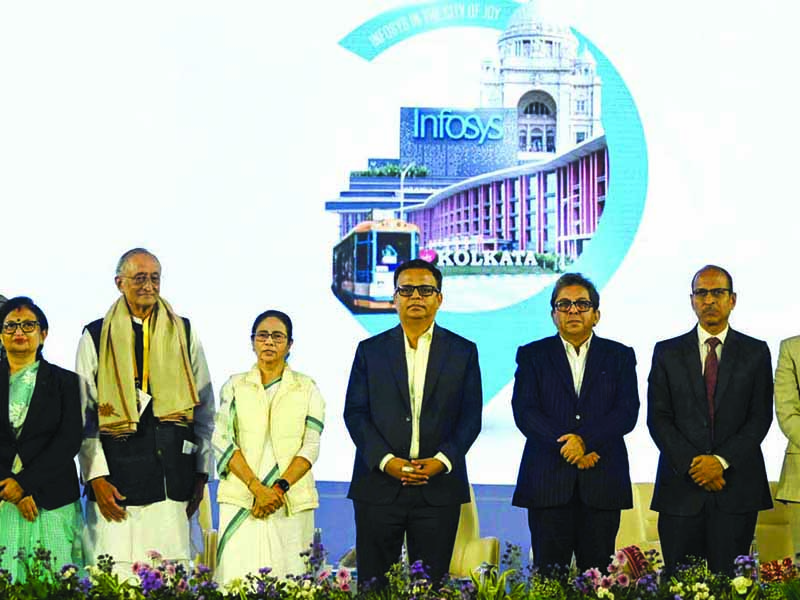West Bengal: Reviving fortunes
Baishali Mukherjee (Kolkata)
With just a year to go for the state legislative assembly election of 2026, the tide may be turning for West Bengal chief minister Mamata Banerjee, whose third term in office has been marked by governance, public safety, and economic progress setbacks. Some recent positive developments have generated hope and promise for her and the ruling Trinamool Congress (TMC).
On December 31, the West Bengal Public Service Commission (WBPSC) announced a fresh teacher recruitment drive for the state’s 84,000 government schools. A fortnight earlier on December 19, the Bengaluru-based ICT (information communication technologies) behemoth Infosys Technologies Ltd (annual revenue: Rs.159,690 crore) inaugurated a mega development centre in Kolkata, signalling revived growth in the IT sector. Moreover on December 10, the state assembly passed two landmark private university bills — the Rabindranath Tagore University Bill 2024 and Ramakrishna Paramhansa University Bill 2024 — showcasing the administration’s focus on advancing higher education.
Teacher testing and recruitment scams and scandals have plagued Banerjee’s third consecutive term as chief minister. Therefore, a fresh teacher recruitment drive to fill vacancies in the state’s 84,000 government schools with a massive aggregate enrolment of 13 million children, is being interpreted as the TMC government’s determination to upgrade public school education stymied by recurring scams and scandals. With recruitment stalled for years, there are 3.5 lakh vacancies in the state’s public school education system. As a result, the average teacher-pupil ratio in West Bengal’s schools has risen to 1:59 against the 1:30 prescribed by the Right of Children to Free & Compulsory Education (RTE) Act, 2009.
Unsurprisingly, children’s learning outcomes have also plunged. According to the Annual Status of Education Report (ASER) 2023, 34.4 percent children in the 14-18 year age group can’t read class II textbooks in their native Bengali language. With children dropping out of education, 8,000 government schools were shut down in March 2023 because they had less than 30 children on their muster rolls. Even at the higher end of the K-12 education continuum, class XI-XII students are dropping out in large numbers — 3.9 lakh between 2022-24.
Consequently, Bengal’s gross enrolment ratio (GER) in higher education has also taken a sharp dip. In 2021-22, West Bengal’s GER was 26.3 percent, against the national average of 25.4 percent and way below Delhi (49 percent), Telangana (40 percent) and Kerala (41.3 percent). Moreover, with only nine colleges per 100,000 population, West Bengal is far short of the all India average of 25 colleges per lakh. With 955 undergrad colleges, the state accounted for only 2.69 percent of colleges countrywide.
Against this backdrop, legislation of new private universities, which raises the number of universities to 44, will create capacity in the state’s higher education system as well as significant employment opportunities. However, the inauguration on December 19 of the development centre of IT major, Infosys Technologies which has offices in more than 50 countries worldwide, marks a major milestone for Chief Minister Banerjee and TMC.
Built at a cost of Rs.426 crore on a 50-acre campus on the eastern fringe of Kolkata, this business development centre will employ 4,000 IT professionals. “This state-of-the-art facility, where IT professionals will drive innovation, stands as a symbol of inclusivity, sustainability, and excellence,” Banerjee tweeted enthusiastically.
Infosys is the latest megacorporate to set up shop in Bengal. An estimated 2,200 IT companies have offices in the state, including TCS, Wipro, IBM and Accenture. A new Silicon Valley involving an investment of Rs.27,000 crore is also rising on 200 acres in New Town, Kolkata with the potential to create 75,000 jobs. Moreover, NTT Tokyo (the fourth largest telecommunications company in the world in terms of revenue) completed construction of the first phase of its data centre campus in Kolkata last March, and CtrlS Datacenter (Asia’s largest data centre operator) announced an investment of Rs.2,200 crore to develop a data centre in the city.
Although in recent years, Banerjee’s leadership has been dimmed by rampant corruption allegations and the RG Kar Medical College rape and murder incident of August 9 which greatly eroded public trust, these latest developments offer her a chance to rebuild her image with the influential middle class which highly values education initiatives. And Infosys’ entry signals an expanding tech footprint in the region and reinforces the state’s reputation as an emerging IT hub.
Political pundits believe that with focused implementation of her development agenda — education, employment, and industrial growth — Banerjee can regain public trust, present herself as a forward-looking, action-oriented leader and consolidate her position before the 2026 assembly election.

















Add comment